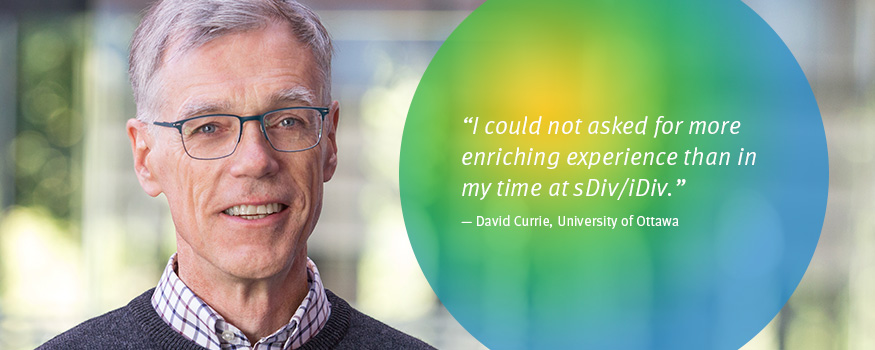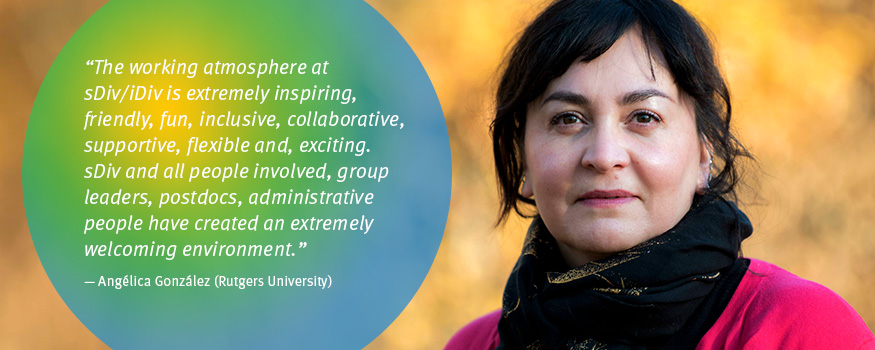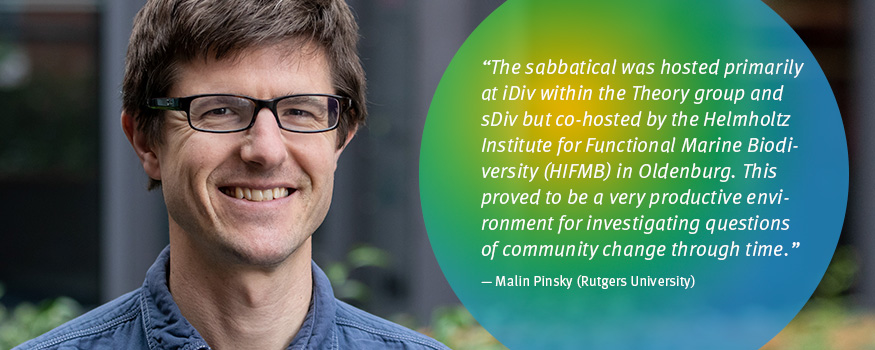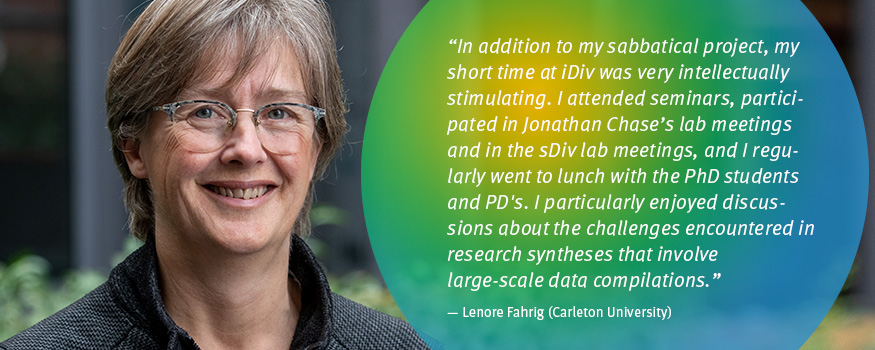iDiv Sabbaticals
Interactions and scientific involvement of iDiv visiting scientists are central mechanisms which contribute to iDiv’s mission to be a leading biodiversity research centre. iDiv sabbatical researchers play an important role in contributing to the iDiv mission through their intellectual and social interactions, in which they share their vision, experience and passion for biodiversity research.
iDiv Sabbatical Board
| Prof Aletta Bonn | Prof Jonathan Chase |
| Prof Stan Harpole (Chair) | Prof Tiffany Knight |
| Prof Ingolf Kühn | Dr Marten Winter |
Admin contact
Current iDiv Sabbatical Fellows
Caroline Farrior
Hosted by Nadja Rüger, Christian Wirth, Thorsten Wiegand, Jens Kattge
Demographic diversity in forests and their influence on ecosystem functioning
Forest ecosystems harbor amazing amounts of biodiversity and play a major role in the global carbon cycle. Using a combination of mathematical models, simulations, experiments, and observations, my research aims to achieve a mechanistic and predictive understanding of forest dynamics (1-3). Recently, my research group has uncovered simple mechanisms of forest dynamics that may explain consistencies in emergent patterns of tropical and temperate forest dynamics. Through collaborations with Rüger, Wirth, Wiegand, Kattge, and others, at iDiv, I plan to study and test the role that these mechanisms of forest dynamics play in driving differences in dominant plant strategies and their diversity in forests in both tropical and temperate zones. While at iDiv, I am eager to generate new insights into the drivers of diversity in forests, develop collaborations, engage with students through a short theoretical ecology course, and practice the integration of basic and applied sciences of biodiversity.
Flavio Nunes Ramos
Hosted by Jonathan Chase
Effect of degradation and heterogeneity on biodiversity of neotropical vascular epiphytes
During my sabbatical at iDiv, I wish to investigate the influence of habitat loss and deforestation on neotropical epiphytes using a synthetic dataset on vascular epiphytes across Neotropical sites as well as a meta-analytic approach. In the synthetic data study, I will explore the effects of forest degradation and habitat heterogeneity on epiphyte diversity across spatial scales. In the meta-analysis, I will compile data and investigate the effect of different land uses on vascular epiphyte diversity. Both studies highlight the importance of understanding the impacts of deforestation on epiphytes, which have a strong dependency on atmospheric climate, since it is their main source of water and nutrients. I expect to have many interactions and collaborations within the iDiv community with scientists from all levels, and hope to leverage this time to develop long term partnerships for future studies.
Past iDiv Sabbatical Fellows
Name (Affiliation) | Research project | Year | Report |
|---|---|---|---|
Priyanga Amarasekare (University of California Los Angeles) | A framework for biodiversity maintenance: scaling up from modules to communities | 2018 |
|
| Meghan Avolio | Investigating the repeatability of global change field experiments | 2023 | |
Stephanie Bohlman (University of Florida) | Linking biodiversity and demography through remote sensing of trait tradeoffs | 2019 |
|
| Cynthia Chang (University of Washington) | Placing ecological succession in applied global change and restoration context | 2022 | download (PDF) |
Douglas Chesters (Chinese Academy of Sciences) | Phylogenetic integration of insect community data | 2019 | |
| Sandra Cuartas (Universidad de Antiquia, Medellin, Colombia) | Meta-networks of species diversity and community pollination in the Andes of Colombia | 2023 | download (PDF) |
David Currie (University of Ottawa) | A continental theory of biogeography: predicting geographic variation in species richness and range size | 2016 | |
Rodolfo Dirzo (Stanford University) | Research on plant-herbivore interactions under climate change and collaborations on biodiversity science | 2017 |
|
Robert Dunn (NC State University) | The Global Biogeography of Microbes and Mutualists Associated with Humans | 2017 |
|
Lenore Fahrig (Carleton University) | Dissecting SLOSS: Why are there more species in several small than few large patches? | 2020 | |
Benjamin Gilbert (University of Toronto) | Project 1 – Neutrality, Demographic stochasticity and ecological drift Project 2 – Local interactions, Regional constraints, and multiple stable states | 2017 |
|
Angélica González (Rutgers University) | Understanding the interactive effects of temperature and nutrients on ecological processes: a meta-analysis | 2018 | |
| Erik Hom (University of Mississippi) | Of Sloths and Franken-Lichens: Elucidating the Biodiversity, Chemical Ecology, and Physiology of Algal Polycultures | 2021 | |
Christopher Klausmeier (Michigan State University) | Synthesizing Trait-Based Ecological Theory | 2019 |
|
Jeremy Lichstein (University of Florida) | Plant functional diversity and forest ecosystem stability: insights from dynamic vegetation models | 2018 |
|
Elena Litchman (Michigan State University) | Trait-based community patterns in microbes | 2019 | |
Laura Lopez-Hoffman (University of Arizona) | Governing biodiversity across space: Discovering principles of sustainability and equity for telecoupled social environmental systems | 2022 | |
Fernando T. Maestre (Universidad Rey Juan Carlos) | Climate change impacts on dryland soil biodiversity and associated ecosystem functions from local to global scales | 2018, 2019 and 2022 | |
Angela Peace (Texas Tech)
| Structured Population Dynamics Subject to Stoichiometric Constraints | 2022
| |
| Roxibell Pelayo Escalona (Universidad de Los Andes, Mérida, Venezuela) | Ecological networks along altitudinal gradients in the Páramos in Venezuela | 2023 | |
George Perry (University of Auckland) | Reconstructing movement and emergent ecological functions for extinct animals | 2019 |
|
Malin Pinski (Rutgers University) | Community response to changing temperatures across marine, freshwater, and terrestrial realms | 2020 | |
Patti Vitt (Chicago Botanic Garden) | Phylogenetic Endemism, Functional Trait Diversity and Conservation Status in the Orchidaceae: a Global Synthesis | 2018 |
|




